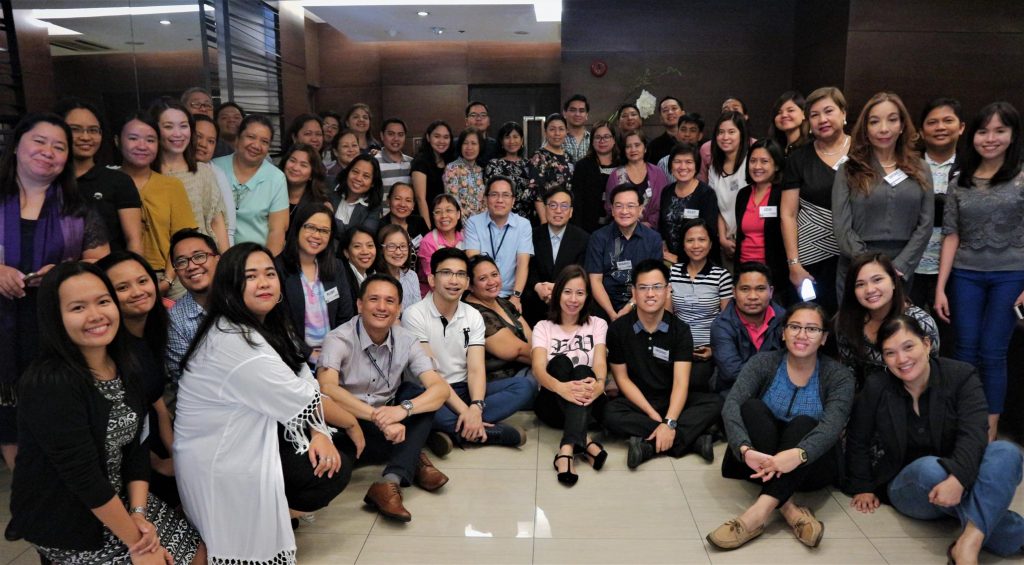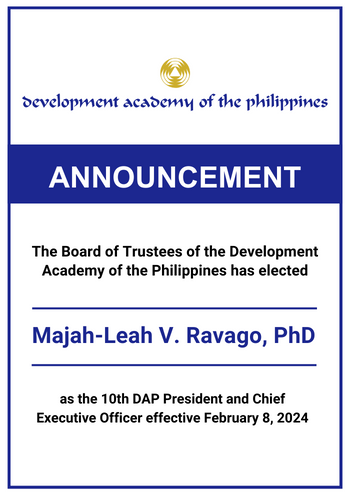 AP VP Arnel Abanto (center) and Dr. Shin Kim (to Abanto’s left), together with participants from different government agencies, pose for posterity during the Training Course on Regulatory Impact Analysis in Pasig City.
AP VP Arnel Abanto (center) and Dr. Shin Kim (to Abanto’s left), together with participants from different government agencies, pose for posterity during the Training Course on Regulatory Impact Analysis in Pasig City.
The Development Academy of the Philippines recently conducted the Training Course on Regulatory Impact Analysis (RIA) for government agencies with regulatory functions at the Astoria Plaza Hotel in Pasig City.
The training course is part of the Modernizing Government Regularizations (MGR) Program being implemented by the DAP in partnership with the National Economic Development Authority (NEDA).
The RIA training featured Dr. Shin Kim, a senior research fellow of the Korea Institute of Public Administration, who highlighted the immense importance of RIA in ensuring the quality of regulations by navigating through the steps in its conduct.
NEDA Assistant Secretary Carlos Bernardo Abad Santos emphasized to the participants the need for the government to implement regulatory reforms to improve the business environment. He noted that regulatory agencies currently implement regulations independent of each other, often resulting in overlaps or conflicting regulations that cause unnecessary burden on business owners.
A priority program
Abad Santos pointed out the timeliness of the DAP’s MGR Program, which has been listed as one of the priority programs in the Philippine Development Plan 2017-2022, particularly for the realization of the sector outcome of “ensuring people-centered, clean, efficient, and effective governance.”
More specifically, the program supports the sub-sector outcome of “achieving seamless service delivery,” focusing on regulatory reform to attract more foreign and local investments and promote enterprise growth as well as wealth and employment creation.
DAP Vice President Arnel Abanto presented the initial recommendations that were borne out of the regulatory mapping activities and stakeholder consultations conducted in 2016.
Abanto also sought the cooperation and support of the agencies present in the upcoming activities of the DAP-MGR Program.
Participating agencies
The 59 participants of the course were able to evaluate actual regulations through the use of proportionate analysis, problem-context analysis, and cost-benefit analysis as well as employment of potential alternative regulatory and non-regulatory instruments to guarantee that regulations are as efficient and effective as possible.
Participating agencies include the NEDA, Bureau of Customs, Civil Aeronautics Board, Civil Service Commission, Construction Industry Authority of the Philippines, Department of Budget and Management, Department of Health, Department of Labor and Employment, Department of Trade and Industry, Department of Transportation, Food and Drug Administration, Forest Management Bureau, Home Development Mutual Fund, Housing and Urban Development Coordinating Council, Land Transportation Office, Maritime Industry Authority, National Food Authority, National Meat Inspection Service, Philippine Drug Enforcement Agency, Quezon City Business Permits and Licensing Office, and the University of the Philippines.
MGR Program
The RIA training, the first for 2017 after three successful runs last year, is one of the components of the MGR Program that aims to enhance the national regulatory infrastructure by developing mechanisms to help improve regulatory quality and coherence.
Through continuous capacity building activities for regulation authorities, the MGR Program intends to eventually institutionalize good regulatory practices, particularly RIA, to ensure better and more responsive regulations that will facilitate the growth of businesses in the country.
For this year, the MGR Program, through its team of experts, is engaging business owners and trade associations as well as pertinent government agencies to examine existing regulations to streamline unnecessary rules and compliance costs borne by five priority industries, which include power, housing, chemicals, logistics, and public transportation, to ensure regulatory effectiveness and to influence them to work together in reducing regulatory burden on businesses. – Lea Peralta and Marbida Marbida




